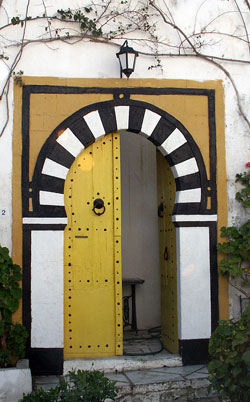T u n i s i a
Tunisia is the northernmost country in Africa. It is an Arab Maghreb country and is bordered by Algeria to the west, Libya to the southeast, and the Mediterranean Sea to the north and east. Its area is almost 165,000 square kilometres (64,000 sq mi), with an estimated population of just under 10.7 million. Its name is derived from the capital Tunis located in the northeast.
It is the smallest of the nations situated along the Atlas mountain range. The south of the country is composed of the Sahara desert, with much of the remainder consisting of particularly fertile soil and 1,300 kilometres (810 mi) of coastline.
The Atlas mountains and the Sahara desert both played a prominent role in ancient times, first with the famous Punic city of Carthage, then as the Roman province of Africa, which was known as the "bread basket" of Rome. Later, Tunisia was occupied by Vandals during the 5th century, Byzantines in the 6th century, and Arabs in the 8th century. Under the Ottoman Empire, Tunisia was known as "Regency of Tunis". It passed under French protectorate in 1881.
After obtaining independence in 1956 the country took the official name of the "Kingdom
of Tunisia" at the end of the reign of Lamine Bey and the Husainid Dynasty. With the proclamation of the Tunisian Republic on July 25, 1957, the nationalist leader Habib Bourguiba became its first president. The country was led by the authoritarian government of President Zine El Abidine Ben Ali from 1987 to 2011 before he fled during the Tunisian revolution. Tunisia now finds itself as an export-oriented country in the process of liberalizing and privatizing an economy that, while averaging 5% GDP growth since the early 1990s, has suffered from corruption benefiting politically connected elites.
Tunisia has relations with both the European Union—with whom it has an association agreement—and the Arab world. Tunisia is also a member of the Arab Maghreb Union, the Arab League, and the African Union. Tunisia has established close relations with France in particular, through economic cooperation, industrial modernization, and privatisation programs.
For more info, please see the link:
...............................................................................................................
Museums in Tunisia
Many thanks to Fiona Jack who spent her time and put all museums in Tunisia on an excel spreadsheet. I have forwarded Fiona's museum spreadsheet to all members in my previous Newsletter. To make it convenient for everyone, I publish the link here to share it with you.
If you are interested in visiting different museums in Tunisia, please follow Fiona's spreadsheet.
................................................................................................................................................
EDUCATION
New and exciting educational opportunities for the young in Tunis.
I would like to tell you about the ‘British International School of Tunis’(BIST) opening its doors in September 2012. A British School, a local school and an International School, purpose built in its own grounds in La Soukra. This year the school will open its doors to the ages of 3 to 8 with this expanding 3 classes in 2013 and 4 further classes taking the children to the end of primary education by 2014. Classes will have no more than 20 students taught by native English speakers other languages are encouraged with the help of multilingual teachers, Tunisian teaching assistants and specialist learning support teachers.
The learning environment will be supportive and challenging meeting the highest standards as recognized by the Council of British International Schools and the British Government’s inspection of overseas schools. BIST follows the broad curriculum of England and Wales with special attention to the diversity and heritage of their location; thus including French and Arabic language classes.
Please look on line at www.bistunis.com to read about the vision of the school, a note from the new Headmaster, David Wilson, the curriculum and extra curricula activities. Also an online registration system can be found on the website. For admissions, prospective pupils will be tested for an appropriate level of English in an informal environment with the Headmaster before a formal offer of a place is made.
If you have any further questions please e-mail info@bistunis.com or telephone
(+216) 28 04 11 11 English/French
(+216) 98 33 60 81 French/Arabic
New and exciting educational opportunities for the young in Tunis.
I would like to tell you about the ‘British International School of Tunis’(BIST) opening its doors in September 2012. A British School, a local school and an International School, purpose built in its own grounds in La Soukra. This year the school will open its doors to the ages of 3 to 8 with this expanding 3 classes in 2013 and 4 further classes taking the children to the end of primary education by 2014. Classes will have no more than 20 students taught by native English speakers other languages are encouraged with the help of multilingual teachers, Tunisian teaching assistants and specialist learning support teachers.
The learning environment will be supportive and challenging meeting the highest standards as recognized by the Council of British International Schools and the British Government’s inspection of overseas schools. BIST follows the broad curriculum of England and Wales with special attention to the diversity and heritage of their location; thus including French and Arabic language classes.
Please look on line at www.bistunis.com to read about the vision of the school, a note from the new Headmaster, David Wilson, the curriculum and extra curricula activities. Also an online registration system can be found on the website. For admissions, prospective pupils will be tested for an appropriate level of English in an informal environment with the Headmaster before a formal offer of a place is made.
If you have any further questions please e-mail info@bistunis.com or telephone
(+216) 28 04 11 11 English/French
(+216) 98 33 60 81 French/Arabic
